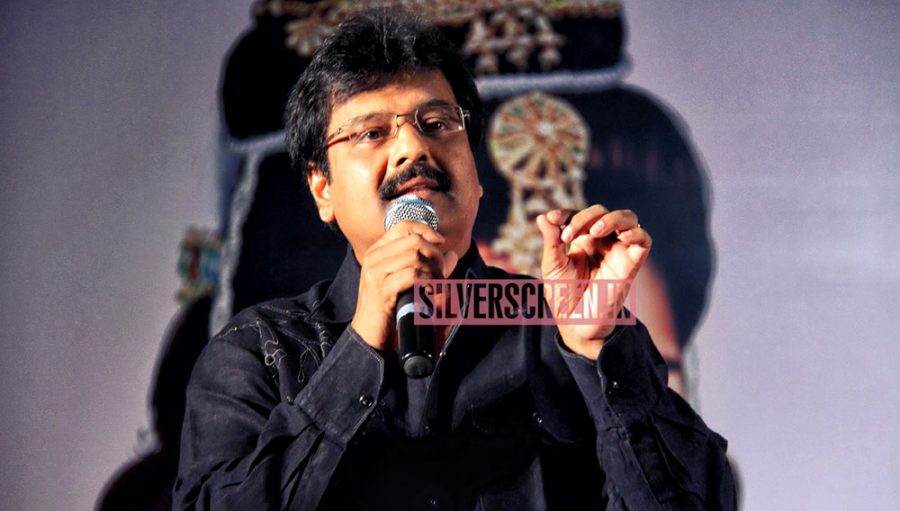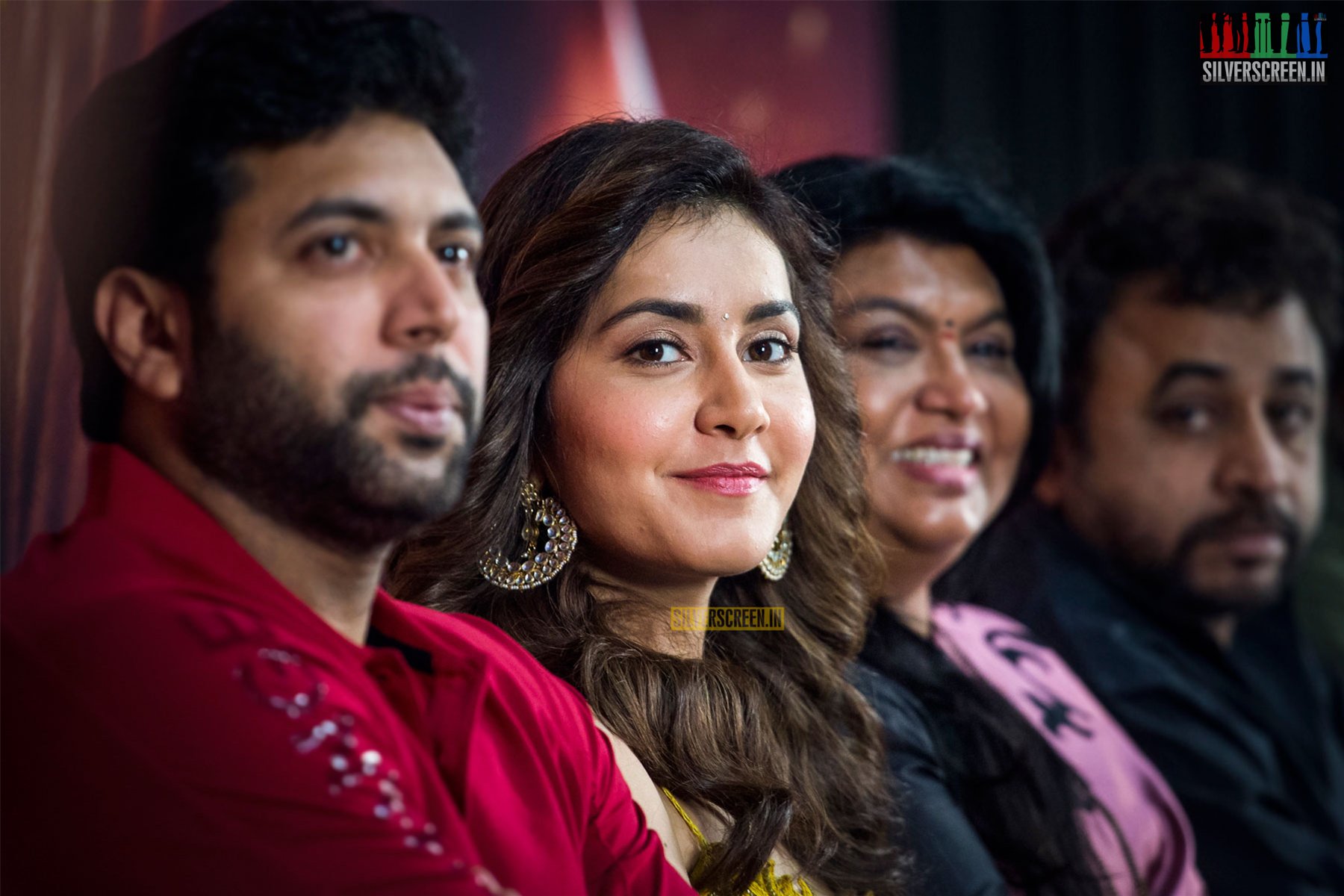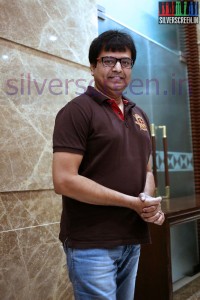
Actor Vivek at Vellayilla Patadhari (VIP) Audio Launch HQ Images
In movies, Vivek is chatty. He jokes and delivers punchlines without a pause. When I phone him requesting for a quick interview though, he goes blank for a moment. Vivek then responds in a measured tone. Each word is spelt out, and delivered deliberately.
Very soon, I learn his schedule for the whole week.
He also invites me over to this office in Virugambakkam. I am not given an address, though. “You can ask anyone on the street for Vivek’s office,” he chuckles.
True to his word, an old security guard on the street provides quick directions even before I could complete my request.
*****
Vivek’s office is in a well maintained old apartment. It reminds me of the one in Anjali; a gaggle of kids here and a sleepy dog there.
Sans the sepia, of course.
A raucous bunch of people wait in one of the halls. Vivek enters adjusting a white Puma cap over his newly-tonsured head. He extends a hand. “I’m so sorry, the place is noisy and dusty because I am renovating the office.” I’m taken to another room, a chair is dusted for me to sit, and Vivek tries to mop up the dust on the floor with his feet.
“Sorry,” he apologises again, “If we weren’t renovating, I could have received you well.”
*****
“Yennai Arindhaal has helped rediscover myself. It’s made me feel like I’m back in the game,” says Vivek. Post the release, Vivek has spent a major portion of his time granting interviews. Although the actor appeared only in a few scenes, it was a refreshing role all the same, and the audience was glad to see him back.
The brief hiatus didn’t cost him dearly, he declares. He found other pursuits, and followed his heart. From 2010 to 2015, Vivek planted about 25 lakh saplings on the advice of Dr APJ Abdul Kalam.

Producer Sanjay and Comedian Vivek at the Sathuranga Vettai Audio Launch
His screen time might have been short in his recent films, “but their reach was great and fulfilling,” he says. “For instance, in Yennai Arindhaal, we shot a lot. Ippolaan aandavan arul kedaikkaradhoda, editor Antony-oda arul romba mukkiyam. Avar kathiri vechidraaru…” he laughs heartily. “In spite of the ‘merciless chopping’, people remembered that I was a part of Yennai Arindhaal.”
*****
Now that he is back at work, Vivek harbours a desire to write scripts and try his luck with direction. “But not in the near future,” he says.
When Sivaji was being filmed, Vivek had conceived an idea to make a commercial film with Rajinikanth. “He heard the one-line synopsis and just smiled. But the idea is still there.”
His thirst to write something for Rajinikanth was quenched when Vivek was asked to write a couple of punchlines for Superstar in Sivaji. His favourite being, “Six-ku apram seven da. Sivaji-ku apram evan da!”
Vivek couldn’t hear the line even once in the theatre, it was always met with thunderous applause.
*****
I then hear a confession.
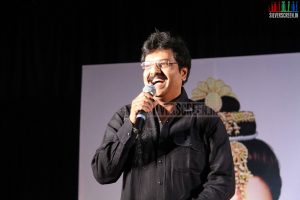
Actor Vivek at Aayirathil Oruvan Silver Jubilee Event Stills
The story would apparently revolve around the importance of farming. “After school, most choose engineering, medicine and other mainstream courses. This film would encourage them to take up farming.”
“Vingyaanathukku sellum ilaignargale, vivasaayaththukkum vaarungal... ”
He declares with a flourish.
The idea was duly shared with Ajith during the shoot of Yennai Arindhaal. The actor had told him, “Vivekji, Yennai Arindhaal-ku apram busy aayiduveenga… Epdi padam pannuveenga?”
Vivek narrates this in stilted tones. It was Ajith speaking, you see.
*****
Having been in the industry for nearly three decades, Vivek says he can now afford to “branch out”. “I have a lot of ideas which I would like to try, I am now starting to be busy again.” He would like to try his hand at theatre too. “People look down upon you when you appear in TV programs. Theatre also evokes a similar reaction.”
From 1998 to 2003, he was one of the most active actors in Kollywood. “It was a mad chase. And, I had no clue about what I was chasing,” he suddenly turns philosophical. A quote of Swami Vivekananda is then offered at every juncture.
“I have become spiritual and more focused…ippo konjam pakkuvam vanthurukku… Ippo oru thrupthi kedachirukku…”
*****
As a veteran humourist, Vivek observes that comedy in Tamil cinema has evolved. “Separate tracks are hard to come by. But naan vanthurukken ippo. Inimel varalaam,” he laughs. Vivek also often finds himself trying to fathom ‘dark humour’. “Edho pudhusa solraanga. How could humour be dark! That’s a paradox.”
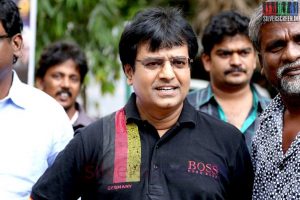
naan-thaan-bala-press-meet-vivek-swetha-lq-012
His track in Saamy is the kind of comedy that Vivek loves; a right balance between being responsible and not being preachy. “I had about 12 sections in my track, and I received tremendous feedback. At an event, Rajinikanth said that I could bring modern Bharathi to life.” Vikram, with whom Vivek has done quite a few films like Saamy, Dhil, Dhool, Anniyan, is the comedian’s favourite co-star.
*****
Ideas and jokes appear out of nowhere for Vivek, just like the tale I heard. He doesn’t jot them down either. “Manasula thangum,” he says. From choosing the names of his characters to the jokes that he cracks, there is no clockwork mechanism in place. “If you have done it all your life, it’s no big deal at all.”
He borrows names of his best friends and favourite deities quite often, for his characters. “I named my character in Bhavani IPS Giri because I was doing girivalam then,” he says. “I was a cartoonist in Parthiban Kanavu. Remember what I signed as under my sketch, after quarrelling with my wife?” he asks. “Mano. I named myself after my close friend.”
*****
His characters and jokes are inspired by real life. However, Vivek says “real life” has no impact on him when he is at work. He can effortlessly switch between the two. “We must remember that comedians like me can be funny on the sets, even if someone died in the family.”
Vivek’s humour, Sadhguru Jaggi Vasudev had once observed, shields him from being affected by the banality of life. At Sadhguru’s meditation centre once, when all participants wept during a session, Vivek was surprisingly calm. “But that scared me. I was afraid I wouldn’t feel anything. Marakkattaiya aayitenonu oru bayam. Sadhguru told me my humour is like a lubricant that maintains my equilibrium.”
*****
The industry taught Vivek some crucial lessons in life. “Tamil cinema doesn’t appreciate candour. As the saying goes, silence is indeed golden here.” And the harshest lesson is that an artiste is only as good as his last film. “Your previous hits will not help if the last movie was a flop. Also, virtue has no place here. Only the market value…” he declares. “Thoongum bodhu kooda kaala aatikkittey thoonganum… ”
[quote align=’left’]”Comedians like me can be funny on the sets, even if someone died in the family.”[/quote]A writer himself, Vivek observes that the industry is unkind to writers. “I was a playwright first. So, I understand the struggles of writers. And that’s why, I ensure that I share the limelight with them. Writers are not paid enough in Tamil cinema. They cannot stoop down and ask for better compensation. Filmmakers should give them due recognition.”
*****
Recommended
When he has some time on hand, Vivek watches his mentor K Balachander’s films often. He has lost count of the number of times he watched Moondru Mudichu, Avargal and Punnagai. “You can still make a film like Punnagai. I am in awe of the fact that it still stands relevant.”
Also, Vivek is glad to have reduced the number of books in his to-be-read shelf. From Sidney Sheldon to Robin Sharma, he devours everything. “I am a little contradictory that way. I read fiction, self-help and spiritual books too. Where does all the philosophy stem from, you ask?”
He chuckles appreciatively.
“I love Ramakrishna’s Amudha Mozhigal. Did I use too many quotes of Swami Vivekananda?”
*****
The Vivek interview is a Silverscreen exclusive.
